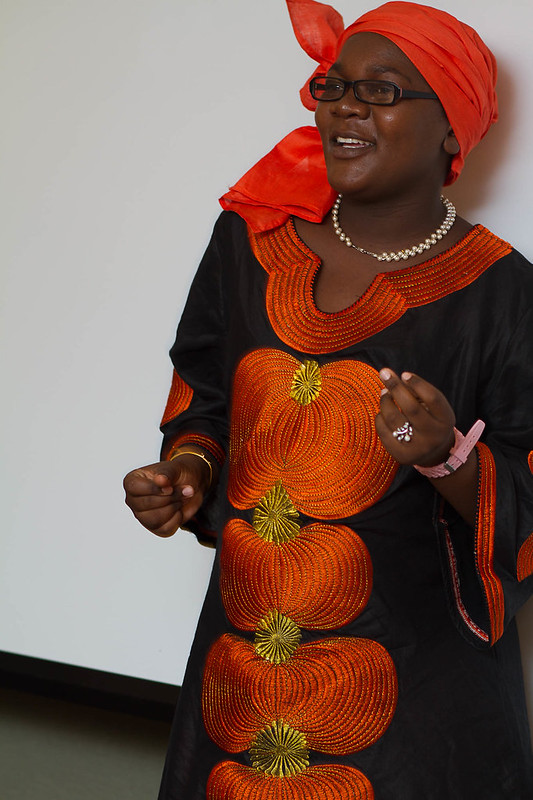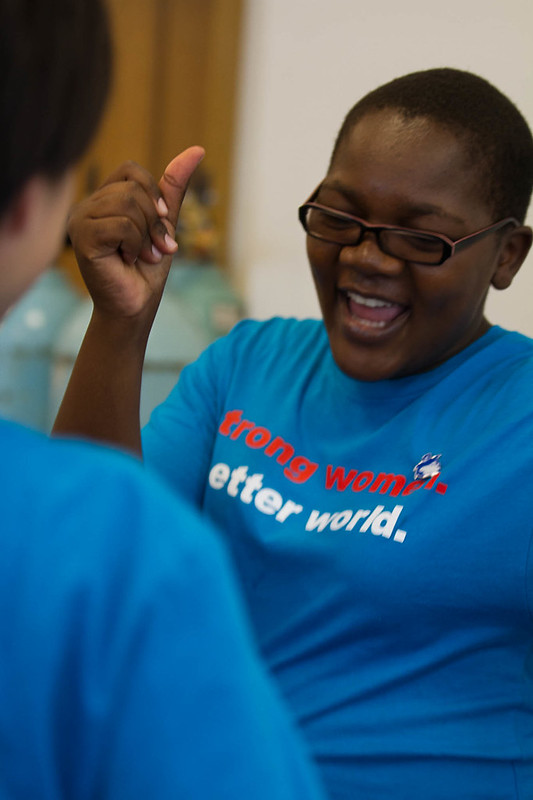
When Grace Chirumanzu was a little girl, there was no such thing as female sports journalists in Zimbabwe, but that didn’t stop her from dreaming of one day becoming a renowned sports reporter. “My superpower has always been dreaming ‘the impossible,’” she says. Grace draws inspiration from how hard her parents worked to give their family a better life. Having grown up in the ghetto in Harare, Zimbabwe, Grace says, “I want to prove that your background does not have to determine your destiny or limit your dreams.” Grace didn’t just break through the glass ceiling to become one of the country’s first female sports journalists, she then went on to earn a master’s degree, become a karate champion, and founded Zimbabwe’s first platform for discussing women in sports, The Sports Queen.
Gender equality amendments to Zimbabwe’s constitution were enacted in 2013, but cultural norms still hold domestic violence as a useful disciplinary tool. Moreover, the country’s economy has historically created obstacles for women to live independently. Even companies with full-time workers can’t always sustain the salaries promised to their employees. Newsrooms have traditionally been places where women are overlooked or harassed, and sports journalism is often a field that women avoid.
As a sports journalist, Grace interviewed many athletes who struggled, had setbacks and were feeling defeated, but they drew on an inner reservoir of belief and hope. “I am always aware that the world will not dish out success to every human. Success and the reality of your dreams takes a good fight to achieve.” Grace found herself moved by the stories of the athletes she spoke with, and was inspired to start training in a sport herself. She chose karate. “I have always been motivated by society’s negative thoughts about women,” Grace says. “Something people think women can’t do would appeal to me.”

In 2009, Grace was interviewing her karate instructor before his departure to Japan for the World Cup Championship. “That day, I naively made a promise: I told him if he were to be crowned World Champion, I would start training with him upon his return.” Days later, her instructor Samson Maripo became the first African ever to win the World Title. “I had to honor my promise, and I started training,” she says.
Grace believes in the power that sport has to teach teamwork, concentration, determination, and discipline, and she feels sure that it can help to fight back against some of Zimbabwe’s systemic problems. “Karate has toughened me, physically and mentally,” says Grace. She believes that sports can serve as a life coach to other African women. It’s a place where they can find support, therapy, and where they can discover their abilities to achieve.
As Grace spent time in the newsroom and working as a freelance journalist, she became well aware that women’s stories in sport weren’t getting coverage. “It is generally believed,” she says, “that sports news about women doesn’t sell. If inspiring stories of women in sport are not told in the media, how will people get excited about what they don’t know? There is not enough zeal or hype of women’s sports in the media to excite spectators.” Grace knew she wanted to create a platform for discussing women in sports, but she feared that, as just one person, she may not be able to make a difference for women in her country.

Fortunately, an opportunity in 2012 would provide Grace the connections she needed. She participated in the Global Sports Mentoring Program (GSMP), traveling to ESPN’s Connecticut Campus. There, she spent three weeks under the mentorship of the Senior Coordinating Producer of ESPN, Tina Thornton, who would create an action plan with Grace, and share her extensive experience in production, sales, and revenue generation. Grace then spent two weeks in Washington, D.C. undergoing leadership training with the University of Tennessee’s Center for Sports Peace and Society (CSPS).
These five weeks spent with female leaders from around the world would be transformational for Grace. Though she describes herself as fun, and a “proud African woman,” she is also an introvert. “I was a lone ranger,” she says, “but I discovered how amazing it was to work together as women encouraging each other. I realized how powerful it is for other women to believe in me and support me.” She also built and grew a network of allies within ESPN, the U.S., and globally. “I know I have sisters in every continent,” she says. “I value that network.”
She also came to realize how important it was to have a female mentor who could help Grace develop her mission and plan to execute it. She understood that she needed to facilitate the same opportunity for women in the media in Zimbabwe. It was here that her idea for All Women in Sports Media (AWSM), a mentorship program for aspiring female journalists, was born.
When Grace returned to Zimbabwe, she immediately set to work building a community to participate in AWSM. Then, in 2016, she launched an online magazine, Sports Queen (SQ), to tell the stories of Zimbabwe’s women in sport and celebrate their achievements. Of her dreams for SQ, Grace says, “I know I will not change the gender imbalance in sport with just this one magazine.” Grace does not expect to wipe clean a whole generation of chauvinistic sports media, but she feels confident that she can and will inspire one or two African girls out there to see the benefits of sports and excite a few spectators along the way.
In 2018, Grace was training hard and working on her master’s degree in the U.K. Though she was far from home, and all of her karate fellows were back in Zimbabwe, she kept pushing herself, winning a bronze medal at an international karate tournament in Scotland. This was a big moment for both her and Zimbabwe, and when she returned home, she was awarded the Sportswoman of the Year for 2018, which she says felt like “a big warm hug from all Zimbabweans.” Grace felt compelled to pay it forward, and used her prize money to host an event to award women in sport for their achievements. “It was the best thing to happen to me in sport,” she says. “I was empowered to empower other women.”
Currently, Grace is one of only a handful of female sports journalists in Zimbabwe. She continues to fight for better access and more coverage for women in sports, and has mentored a number of women in the field. Grace feels overwhelmed at times by the task she has set for herself, but draws on what she learned in karate for strength. “It helps,” she says, “to have experience being pinned to the ground, and having to find the will to get up and face an opponent to the end.”